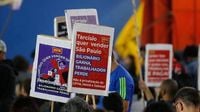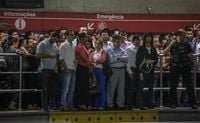São Paulo is bracing for significant disruptions beginning Wednesday, March 26, 2025, as railway workers of the Companhia Paulista de Trens Metropolitanos (CPTM) are set to strike in protest against the upcoming privatization of several train lines. This strike, spearheaded by the Sindicato dos Trabalhadores em Empresas Ferroviárias da Zona Central do Brasil (STEFZCB), follows a decision taken in an assembly on March 25, where union members voted overwhelmingly in favor of the move.
The strike will specifically affect lines 11-Coral, 12-Safira, and 13-Jade, all crucial for daily commuters in the eastern sectors of São Paulo, connecting them to major hubs in the city. The planned auction of these lines, scheduled for March 28 at the B3 stock exchange, has prompted the strike as workers express concerns over service quality, job security, and the broader implications of privatization.
During a general strike assembly held on March 25 at 20h at the union's headquarters in Brás, STEFZCB articulated its commitment to using the strike as a legitimate tool to push back against the state government’s privatization initiatives. The union's statement read, "We will have a strike to strengthen our resistance and pressure the government to withdraw this proposal for privatization. The strike is a legitimate means of struggle." This sentiment echoes a broader frustration among railway workers who fear that privatization may lead to poorer service standards, increased fare prices, and a loss of jobs.
The governor's administration estimates that privatization could inject around R$14.3 billion in investments over the next 25 years, purportedly to enhance service quality and modernize the infrastructure. However, critics argue that privatization projects previously executed in the region, such as the lines 8-Diamante and 9-Esmeralda, have suffered from budget cuts that negatively impacted service delivery and passenger experience.
Fernando Ricardo Santos da Costa, a director at STEFZCB, remarked on the state of privatized lines, stating, "Users of privatized lines in recent years have encountered issues of slow service and inadequate maintenance as a result of cost-cutting measures." He emphasized the need for public accountability in ensuring quality service, arguing that private operators prioritize profits over passenger needs.
As the strike prepares to commence at midnight, commuters should prepare for significant delays, as the services on lines 11-Coral, 12-Safira, and 13-Jade are poised for disruption. With an estimated daily passenger load of approximately 830,000 across affected lines, the strike threatens to exacerbate the already strained public transport system, particularly impacting the busy Line 3-Vermelha of the city's Metro system, which is expected to see an influx of riders seeking alternative transit options.
In response to the pending strike, the state government faces mounting criticism for failing to announce a solid emergency plan to alleviate the impact on commuters. Past efforts to counteract similar strikes, such as implementing the Paese bus system, have often proved insufficient to meet the high demand. Regular commuters are likely to seek alternative arrangements, which could include buses or app-based transportation services, both of which can be slower and more costly.
Furthermore, on March 25 at 9h, workers and supporters will gather outside the B3 in a demonstration against the auction, highlighting their demands for the government to engage in meaningful dialogue about the future of the CPTM lines. With the auction scheduled imminently, this has sparked significant public concern and community activism aimed at preserving public transport integrity.
The broader context of this dispute ties back to ongoing tensions regarding transportation policy under the management of Governor Tarcísio de Freitas, whose administration has pushed several privatization efforts, including the controversial deal involving the Companhia de Saneamento Básico do Estado de São Paulo (Sabesp) last year. Workers state that such privatization measures often favor corporate interests at the expense of service quality and community needs.
While Metro workers organized by the Sindicato dos Metroviários de São Paulo are showing solidarity, it is important to note that they have not officially joined the strike. Rather, they have called for a week of action to support the railway workers' movement, emphasizing the need to maintain a unified stance against privatization in public services.
As of now, commuters are advised to monitor updates from CPTM, Metro, and local transport authorities while considering alternative routes, especially during peak hours when congestion is most severe. Key transfer points like Tatuapé and Corinthians-Itaquera are expected to experience heightened traffic, further straining the public transport system.
In conclusion, the rail strike on March 26 is not simply a labor dispute but a significant protest against privatisation in public services. The outcome of this struggle has the potential to reshape public transport policy and affect the quality of life for millions of São Paulo residents who rely on these crucial transit lines for their daily commutes.









